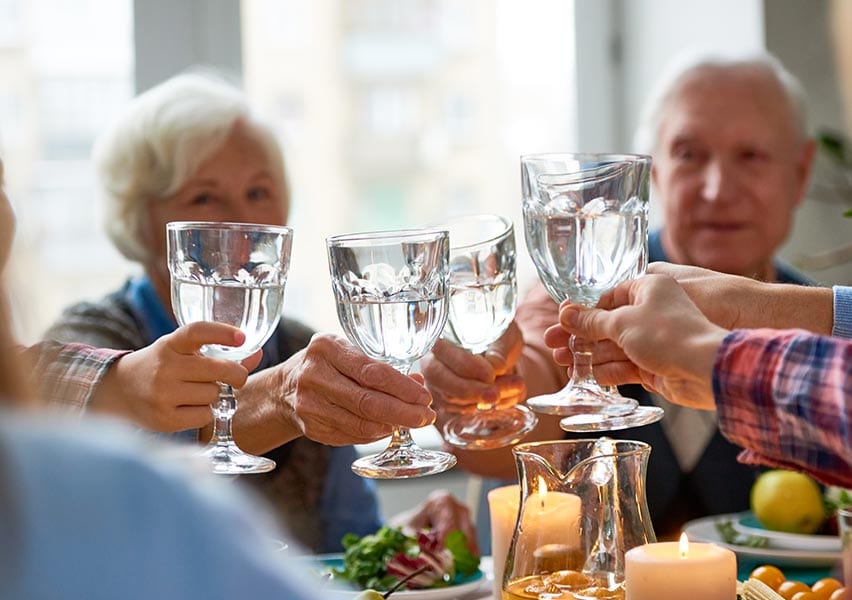In the summer months when the scorching sun offers no reprieve, nothing sounds better than a tall glass of ice cold water. Quenching your thirst on a hot day automatically makes you feel better and more prepared to handle the weather. As you age, this may not be the case anymore. You lose your ability to feel thirst as strongly as before, and you may find yourself getting easily dehydrated as a result.
It’s not just seniors with memory problems who have issues staying hydrated. Studies have shown that many older adults suffer from dehydration without realizing it, increasing your odds of issues like urinary tract infections and pneumonia. Not staying hydrated comes with many more risks to your health as well, with the potential for a coma or death.
Today, we’ll go over how you can catch the signs of dehydration in the elderly and encourage hydration for seniors.
What causes dehydration in seniors?
Among people of all ages, seniors are the most likely to lose water the fastest. This happens because we lose our ability to retain water as we age. As kidney function decreases, our bodies do not hold as much water and become dehydrated faster.
Due to changing muscles and senses, older adults also lack a perception of thirst. Typically, when a senior is thirsty, they are likely closer to dehydration than normal thirst. Some seniors who have had strokes may not experience thirst at all if that area of their brain was affected.
A fear of falling may make a senior drink less water too. Sometimes, seniors will fear having to get up in the middle of the night to use the bathroom, concerned they will fall and injure themselves. The fear is rooted in reason, as the CDC has reported that falls are the leading cause of injury and death for older adults. However, dehydration actually makes you more likely to suffer a fall than if you stayed hydrated.
What are the signs of dehydration?
Dehydration can be easy to miss, which is why it’s so important to be able to recognize the symptoms before they worsen. If you’re concerned that you or a loved one is becoming dehydrated, you should take immediate action. The longer you wait, the greater your chances are of doing permanent damage to your body.
Minor symptoms of dehydration include:
- Dry mouth
- Irritability
- Headache
- Body aches
If dehydration symptoms worsen, you may experience:
- A lack of urination
- Confusion
- Decreased skin elasticity
- Rapid heartbeat and breathing
What can I do to prevent dehydration?
Dehydration in the elderly is not something to be taken lightly. Follow these tips to ensure you are getting enough hydration for yourself or a loved one:
- Offer water often. Since an older adult may not take it upon themselves to drink water, it’s necessary to offer water to them on a regular basis. Water is very similar to medicine and should be treated as such.
- Balance output with intake. If you are working out or are suffering from a fever, your body will naturally expel more water than usual. In cases like this, you should be especially careful to consume more water to offset the loss.
- Try an alternative to water. If a senior doesn’t experience thirst, they may not be interested in tasteless water. Consider mixing half water and half juice so your senior can stay hydrated while still enjoying some flavor. You can also explore using carbonated or flavored waters to help them stay hydrated.
- Eat your water. While it may sound silly, you can actually eat a good amount of your needed water intake. Foods like cucumbers, lettuce, oranges, strawberries and watermelon are 80-90% composed of water, making for a perfect meal or snack when you need to hydrate.
Being vigilant about your water intake can be difficult. If you or a loved one wants help with these tasks, contact Culpepper Place.
Our assisted living facility in Olive Branch, MS helps seniors to focus on their health and happiness to live their best lives.






